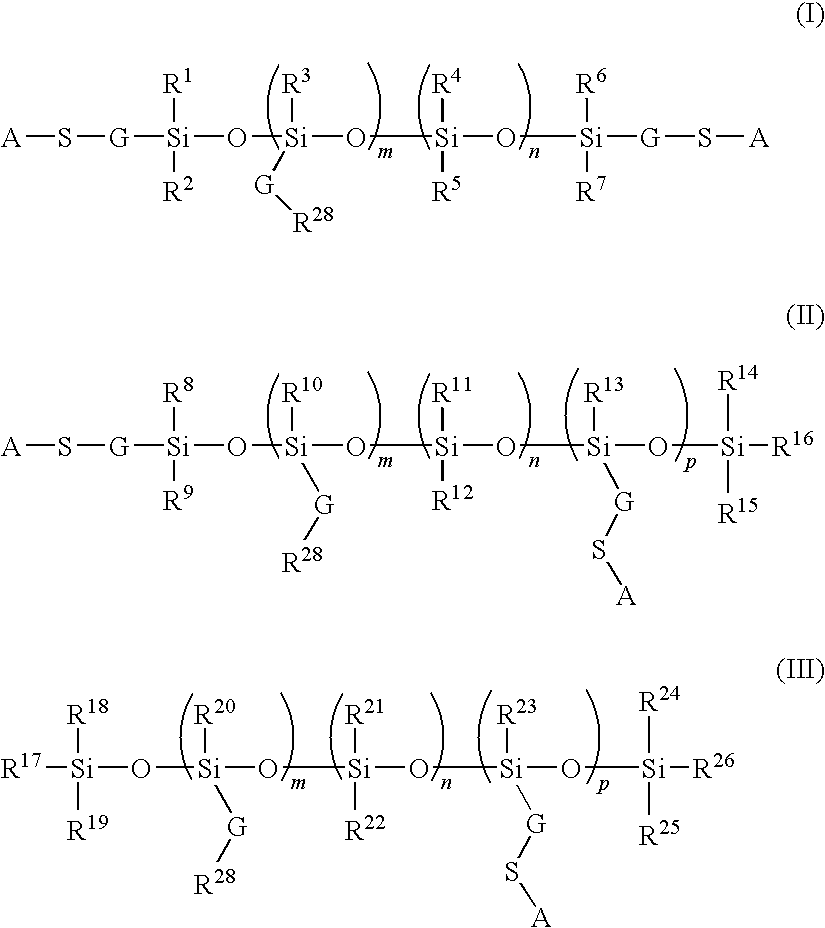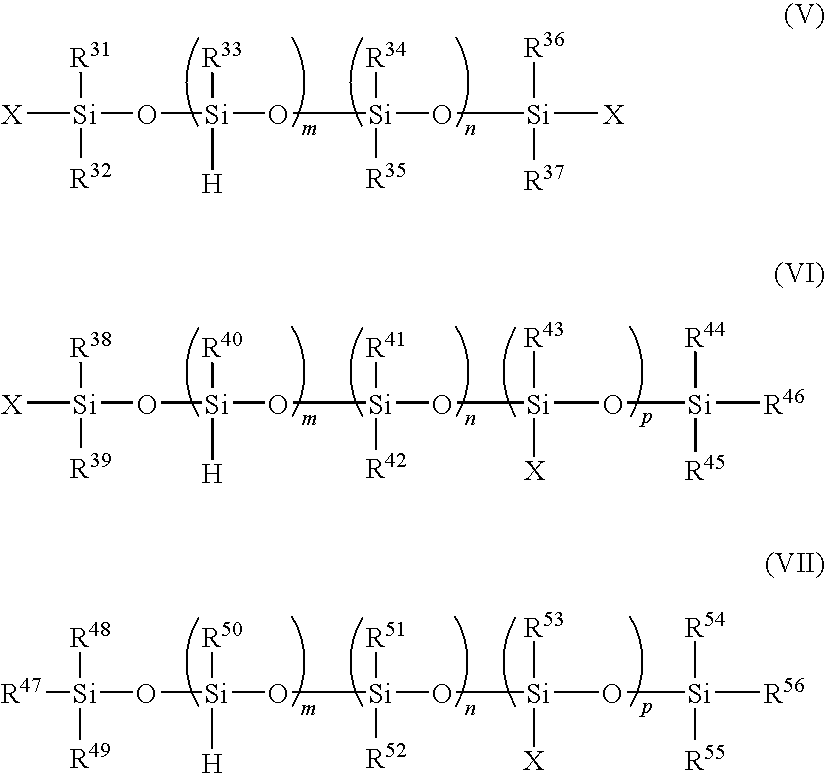Polyorganosiloxane composition for use in unsaturated elastomer, article made therefrom, and associated method
a technology of unsaturated elastomer and polyorganosiloxane, which is applied in the direction of dyeing process, textiles and paper, etc., can solve the problems of premature cure, high chemical activity of mercaptosilane, and low mechanical properties of inherently low properties
- Summary
- Abstract
- Description
- Claims
- Application Information
AI Technical Summary
Benefits of technology
Problems solved by technology
Method used
Image
Examples
example 1
Preparation of Polydimethylsiloxane (PDMS) with Thio-Acetate End Caps
[0103]A vinyl-terminated PDMS fluid (312 grams, GE Silicones 81865, MW ˜1670 grams per mole) is charged into a three-necked 1 Liter round-bottomed flask equipped with an immersible Teflon-coated thermocouple, a large magnetic stir bar, water-cooled straight-bore condenser and a septum inlet. A magnetic stirrer agitates the PDMS mixture and a thin stream of air is bubbled into the PDMS fluid by means of fine-gauge Teflon capillary tube lowered into the fluid. A 5 percent stoichiometric excess of thio acetic acid is added dropwise over the course of 3 hours through a fine-gauge Teflon cannula. The rate of addition is controlled such that the temperature of the reaction mixture approaches, but does not exceed 40 degree Celsius due to the strong reaction exotherm. The mixture is then allowed to stir overnight with continued air bubbling. The mixture is stripped of volatile contaminants and unreacted thio acetic acid by...
example 2
Preparation of Sample 1
[0104]A formulation as described in Table 1 is used to compound a rubber formulation containing S-PDMS, the rubber formulation is hereinafter referred to as Sample 1. A two-step mixing process is used to compound these materials. In the first mixing step, the elastomer (Natural Rubber), carbon black (N121), stearic acid, zinc oxide, wax, antiozonants, antioxidants, and deblocking agents are added to Brabender batch mixer, preheated to a temperature of 50 degrees Celsius. The mixer speed is increased in a stepwise manner to 80 rpm and the temperature is increased to 150 degrees Celsius after the addition of the ingredients. After cooling, the vulcanizing package, including the S-PDMS and accelerator (optional), is added in the second mixing step to the mixer rotating at 40 rpm and at a temperature of 50 degrees Celsius. Some amount of carbon black is also added in the second mixing step to densify the (liquid) PDMS, and thus facilitate its addition to the mixtu...
example 3
Curing Results
[0108]A parallel-plate rheometer is used to study the curing characteristics of Samples 1, 2, 3 and 4. The specimen tested in the rheometer is 25 millimeters in diameter, and between 1.6 and 2 millimeters in thickness. A normal force of 100 grams is applied on the sample at all times during testing. The test is conducted at 160 degrees Celsius, 10 radians / second frequency, 2 percent strain, for a time that is either 30 or 60 minutes. The two platens of the rheometer are serrated to prevent the specimen from slipping at the interface between the sample and the surface of the platen. Storage moduli are measured for Samples 1, 2, 3 and 4 as a function of curing time.
[0109]Table 1 shows the rheology results for Samples 1, 2, 3 and 4. The final storage modulus for Example 2 (Sample 1) is greater than Comparative Example 1 (Sample 2). The final storage modulus for Example 2 (Sample 1) is similar to that of Comparative Example 2 (Sample 3) and greater than that of Comparative...
PUM
| Property | Measurement | Unit |
|---|---|---|
| weight percent | aaaaa | aaaaa |
| elongation at break | aaaaa | aaaaa |
| molecular weight distribution | aaaaa | aaaaa |
Abstract
Description
Claims
Application Information
 Login to View More
Login to View More - R&D
- Intellectual Property
- Life Sciences
- Materials
- Tech Scout
- Unparalleled Data Quality
- Higher Quality Content
- 60% Fewer Hallucinations
Browse by: Latest US Patents, China's latest patents, Technical Efficacy Thesaurus, Application Domain, Technology Topic, Popular Technical Reports.
© 2025 PatSnap. All rights reserved.Legal|Privacy policy|Modern Slavery Act Transparency Statement|Sitemap|About US| Contact US: help@patsnap.com



